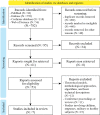Do patients with neurological disorders benefit from immersive virtual reality? A scoping review on the emerging use of the computer-assisted rehabilitation environment
- PMID: 37971719
- PMCID: PMC10939039
- DOI: 10.23736/S1973-9087.23.08025-5
Do patients with neurological disorders benefit from immersive virtual reality? A scoping review on the emerging use of the computer-assisted rehabilitation environment
Abstract
Introduction: Virtual reality (VR) is an advanced technology that creates simulated environments and conditions. By offering the possibility of combining motor, cognitive, and well-being in conjunction with the potential to manipulate multi-sensorial features in a safe environment, VR has emerged as a promising powerful rehabilitation tool. Among advanced VR systems, various authors have highlighted promising effects in the rehabilitation of the computer-assisted rehabilitation environment (CAREN - Motekforce Link; Amsterdam, The Netherlands). In our scoping review, we aimed to map the existing evidence on the use of CAREN in the rehabilitation of neurological patients.
Evidence acquisition: This scoping review was conducted following the PRISMA guidelines. A search was carried out for all peer-reviewed articles published until June 30, 2023, using the following databases: PubMed, Embase, Cochrane Database, PeDro and Web of Science. The following terms have been used: ("Cognitive Rehabilitation" OR "Motor Rehabilitation" OR "CAREN" or "Computer-Assisted Rehabilitation Environment") AND ("Virtual Reality" OR "Rehab").
Evidence synthesis: From the assessed studies, only seven met the inclusion criteria: 1) one study concerned cognitive rehabilitation in patients suffering from Parkinson's Disease (PD); 2) one was on the usability of CAREN in PD patients; 3) two studies related to the influence of emotional components to CAREN rehabilitation; 4) three studies were related to motor rehabilitation using CAREN, and involved individuals with PD, Multiple Sclerosis, TBI, respectively. Generally, the few assessed studies demonstrate that CAREN is a safe and potentially effective tool to treat different symptoms (including gait and vestibular disturbances, executive function, depressive mood, and anxiety) in patients with different neurological disorders.
Conclusions: The reviewed literature indicated the potential use of CAREN in improving motor and cognitive skills with conflicting results on emotional aspects. However, since the data comes from few and small sample size studies, further research is needed to confirm the effectiveness of the tool in neurorehabilitation.
Conflict of interest statement
Figures
Similar articles
-
Improving motor performance in Parkinson's disease: a preliminary study on the promising use of the computer assisted virtual reality environment (CAREN).Neurol Sci. 2020 Apr;41(4):933-941. doi: 10.1007/s10072-019-04194-7. Epub 2019 Dec 19. Neurol Sci. 2020. PMID: 31858331
-
Immersive VR for upper-extremity rehabilitation in patients with neurological disorders: a scoping review.J Neuroeng Rehabil. 2024 May 11;21(1):75. doi: 10.1186/s12984-024-01367-0. J Neuroeng Rehabil. 2024. PMID: 38734690 Free PMC article.
-
Coupling neurologic music therapy with immersive virtual reality to improve executive functions in individuals with Parkinson's disease: A Quasi-Randomized Clinical Trial.Clin Park Relat Disord. 2024 Oct 21;11:100277. doi: 10.1016/j.prdoa.2024.100277. eCollection 2024. Clin Park Relat Disord. 2024. PMID: 39507632 Free PMC article.
-
Does cybersickness affect virtual reality training using the Computer Assisted Rehabilitation Environment (CAREN)? Preliminary results from a case-control study in Parkinson's disease.Physiother Theory Pract. 2022 Nov;38(13):2603-2611. doi: 10.1080/09593985.2021.1964117. Epub 2021 Aug 7. Physiother Theory Pract. 2022. PMID: 34365911
-
Effects of virtual reality-based rehabilitation on cognitive function and mood in multiple sclerosis: A systematic review and meta-analysis of randomized controlled trials.Mult Scler Relat Disord. 2024 Jul;87:105643. doi: 10.1016/j.msard.2024.105643. Epub 2024 May 9. Mult Scler Relat Disord. 2024. PMID: 38735202
Cited by
-
Comparison of the effectiveness of immersive and non-immersive virtual reality in the treatment of vertigo in patients with peripheral vestibular dysfunction: a systematic review and meta-analysis.Front Neurol. 2025 Jul 17;16:1638868. doi: 10.3389/fneur.2025.1638868. eCollection 2025. Front Neurol. 2025. PMID: 40746644 Free PMC article.
-
The Potential Effects of Sensor-Based Virtual Reality Telerehabilitation on Lower Limb Function in Patients with Chronic Stroke Facing the COVID-19 Pandemic: A Retrospective Case-Control Study.Med Sci (Basel). 2025 May 23;13(2):65. doi: 10.3390/medsci13020065. Med Sci (Basel). 2025. PMID: 40559223 Free PMC article.
-
Comparison between Motor Performance of People with Multiple Sclerosis during a Virtual Reality Task Practiced on Concrete and Abstract Devices: A Cross-Sectional Randomized Study.Brain Sci. 2024 Sep 12;14(9):916. doi: 10.3390/brainsci14090916. Brain Sci. 2024. PMID: 39335411 Free PMC article.
-
Upper and Lower Limb Training Evaluation System Based on Virtual Reality Technology.Sensors (Basel). 2024 Oct 28;24(21):6909. doi: 10.3390/s24216909. Sensors (Basel). 2024. PMID: 39517807 Free PMC article.
-
A quantitative assessment of the hand kinematic features estimated by the oculus Quest 2.Sci Rep. 2025 Mar 14;15(1):8842. doi: 10.1038/s41598-025-91552-5. Sci Rep. 2025. PMID: 40087370 Free PMC article.
References
-
- Burdea GC. Virtual rehabilitation—benefits and challenges. Methods Inf Med 2003;42:519–23. https://www.ncbi.nlm.nih.gov/entrez/query.fcgi?cmd=Retrieve&db=PubMed&l... 10.1055/s-0038-1634378 - DOI - PubMed
-
- Wade E, Winstein CJ. Virtual reality and robotics for stroke rehabilitation: where do we go from here? Top Stroke Rehabil 2011;18:685–700. https://www.ncbi.nlm.nih.gov/entrez/query.fcgi?cmd=Retrieve&db=PubMed&l... 10.1310/tsr1806-685 - DOI - PubMed
-
- De Luca R, Russo M, Naro A, Tomasello P, Leonardi S, Santamaria F, et al. Effects of virtual reality-based training with BTs-Nirvana on functional recovery in stroke patients: preliminary considerations. Int J Neurosci 2018;128:791–6. https://www.ncbi.nlm.nih.gov/entrez/query.fcgi?cmd=Retrieve&db=PubMed&l... 10.1080/00207454.2017.1403915 - DOI - PubMed
-
- Maggio MG, Maresca G, De Luca R, Stagnitti MC, Porcari B, Ferrera MC, et al. The Growing Use of Virtual Reality in Cognitive Rehabilitation: Fact, Fake or Vision? A Scoping Review. J Natl Med Assoc 2019;111:457–63. https://www.ncbi.nlm.nih.gov/entrez/query.fcgi?cmd=Retrieve&db=PubMed&l... 10.1016/j.jnma.2019.01.003 - DOI - PubMed
-
- Canning CG, Allen NE, Nackaerts E, Paul SS, Nieuwboer A, Gilat M. Virtual reality in research and rehabilitation of gait and balance in Parkinson disease. Nat Rev Neurol 2020;16:409–25. https://www.ncbi.nlm.nih.gov/entrez/query.fcgi?cmd=Retrieve&db=PubMed&l... 10.1038/s41582-020-0370-2 - DOI - PubMed
Publication types
MeSH terms
LinkOut - more resources
Full Text Sources
Medical
Miscellaneous



